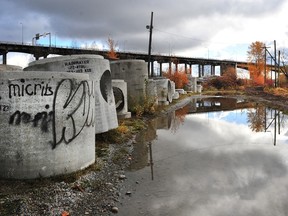[ad_1]
Breadcrumb Trail Links
NewsLocal News
In the last four-and-a-half years, about five million square feet of space lost to Calgary alone cost the region an estimated 6,300 direct jobs and nearly $500 million in GDP

Article content
Vancouver is considering more mixed uses on industrial lands, including multi-storey buildings that will allow for artist studios and work spaces for tech companies and the film industry, according to city reports.
The move is part of the city’s ongoing efforts to change the use of scarce industrial land in the midst of an industrial-space crunch, which is contributing to rising rents, low vacancy rates, and lost revenue and job potential.
Advertisement 2
Article content
Article content
Demand for industrial spaces in Metro Vancouver has grown exponentially in the last decade, due primarily to a growing population and expansion of e-commerce and its need for warehouse space to store and ship goods.
But Vancouver companies have also been clamouring for other working spaces, such as laboratories for biotechnology firms or specialized spaces for the film industry.
As a result, city staff want to update Vancouver’s 1990s-era industrial land policies to protect industrial lands and allow for “balanced intensification” that will provide space for different users and meet long-term demand.
“In the industrial market, low vacancy and rising rents are resulting in growing interest in the development of stacked industrial buildings that include multiple levels of industrial space with floors for non-industrial activities positioned above them,” said the staff report, which is expected to be presented to council on Tuesday.

The ground-level spaces would be reserved for uses that require access to loading, such as production and distribution, it said, while the higher floors would be used for hybrid uses such as labs, testing facilities, workshops and production studios.
Article content
Advertisement 3
Article content
The report said the city is also seeing growing interest in the stratification of industrial buildings and the inclusion of office spaces with amenities for workers and access to outdoor spaces.
Graeme Bullus, of real estate brokerage CDNGlobal, said Vancouver needed to keep its industrial land and that permitting other uses above two stories for industrial use made sense.
“To rezone more density above is no problem,” he said.
While average rents for downtown Vancouver offices have dipped over the last year to $38.56 per square foot, average rents for industrial spaces in Metro Vancouver have jumped by nearly 18 per cent to $21.50, the highest rent among metropolitan areas in Canada.
Rental rates in Vancouver are even pricier at an average of $25.86 per square foot, up from less than $12 per square foot eight years ago.
The report cites the South Vancouver industrial area — which spans several blocks east and west of Marine Drive SkyTrain Station at the south foot of Cambie Street and is one of the last concentrations of large industrial sites in the city — as an opportunity to expand technology applications on upper floors of multi-storey industrial buildings.
Advertisement 4
Article content
Staff are also proposing a review of zoning regulations in the Railtown area, north of the Downtown Eastside. The area is home to a number of creative, design and technology companies that want more space to expand and improve amenities for workers.
The city has previously approved additional industrial density along Second Avenue in Mount Pleasant and the Burrard Slopes.

In a separate report also going before council on Tuesday, staff recommend amending zoning and development bylaws to allow health-care clinics by practitioners including doctors, massage therapists and chiropractors, to set up near workplaces and use shared office arrangements when available.
It also proposes providing incentives for artist studio spaces in the city.
A report last month by the Greater Vancouver Board of Trade and the Vancouver chapter of the National Association of Industrial and Office Parks found that there is a “crisis” of industrial land similar to the housing crisis, with vacancy rates hovering just above one per cent and average land costs tripling over the last five years.
Advertisement 5
Article content
The shortage of industrial spaces mean companies are leaving Greater Vancouver for other cities such as Calgary, Edmonton or in Washington State. The report estimates that in the last four-and-a-half years, about five million square feet of space lost to Calgary alone cost the region an estimated 6,300 direct jobs and nearly $500 million in GDP.
— with a file from David Carrigg
chchan@postmedia.com
x.com/cherylchan
Bookmark our website and support our journalism: Don’t miss the news you need to know — add VancouverSun.com and TheProvince.com to your bookmarks and sign up for our newsletters here.
You can also support our journalism by becoming a digital subscriber: For just $14 a month, you can get unlimited, ad-lite access to The Vancouver Sun, The Province, National Post and 13 other Canadian news sites. Support us by subscribing today: The Vancouver Sun | The Province.
Article content
Share this article in your social network
[ad_2]
Source link



